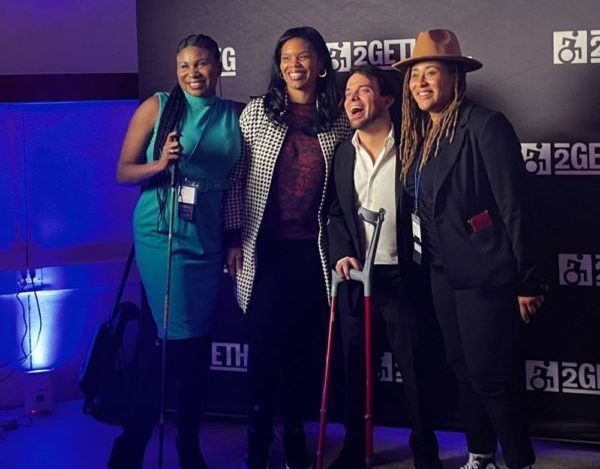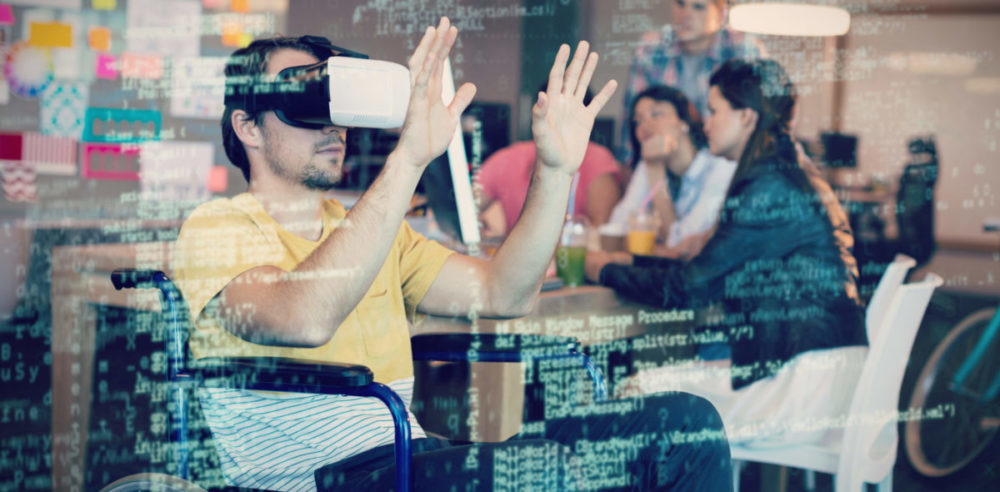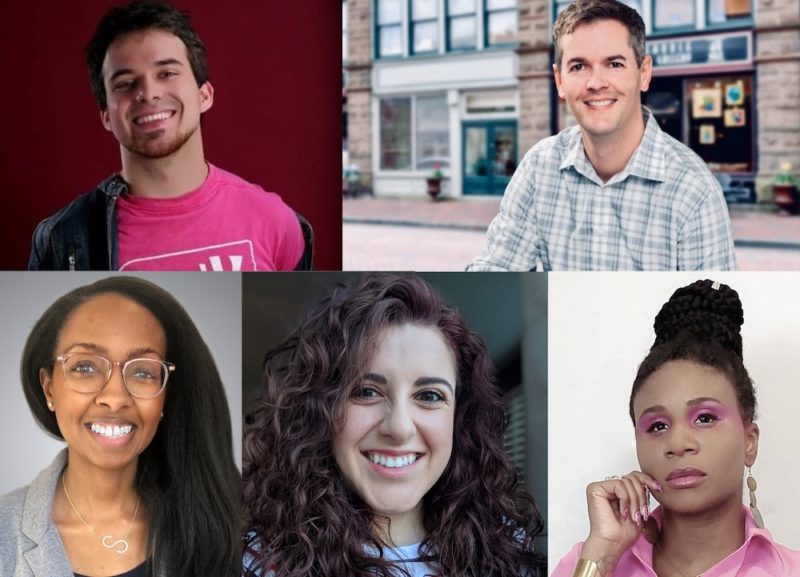Mariscal’s father is a business owner who consults other businesses on being successful. Growing up, Mariscal had always thought he would never do the same, instead wanting to go into politics and change the world.
“Business was never my intention at all,” Mariscal told Technical.ly. “I saw business, not in a negative way, but just not something that I was interested in.”
He still changed the world — by supporting other people with great business ideas.
Today, he’s the founder, CEO and chief disabled officer of 2Gether-International (2GI), a DC-based accelerator program for founders with disabilities that celebrates its 10th anniversary this month. In its decade of life, 2GI has helped approximately 70 entrepreneurs through its accelerator, partnered with the likes of Google for Startups and Comcast NBC Universal and held cohorts for BIPOC founders, as well as healthcare and tech ventures.
But before all that, Mariscal just hoped to improve the lives of people with disabilities everywhere. After moving to DC from Mexico, Mariscal said, he learned about the idea of nothing done about us without us — meaning that the disability rights movement must be not only led by people with disabilities but grounded in supporting them directly, not just educating others.
“It’s interesting how, as founders, especially young founders, you grow up with your company,” Mariscal said. “As I was growing and learning about myself and learning about who I was, I was also learning about the organization, and the organization was also maturing.”
‘The 10-year overnight success’
When it officially launched in 2012, 2GI largely involved Mariscal hosting workshops at schools, which he already did with his first company in Mexico. Finding that they weren’t really having the intended effect, he shifted to campaigns that directly supported people with disabilities.
While the campaigns were a success, many folks with disabilities said it still wasn’t having the direct action he was seeking — especially since unemployment is a major issue among the disabled community.
“People said, ‘Oh your campaigns are great and amazing, but I need a job, I need to make money,'” Mariscal said.
Mariscal encountered the same problem in the first roughly five years. Unable to pay himself a proper salary, he was living on Social Security, conducting workshops on the side and renting out his one-bedroom apartment to as many as seven people at a time to make ends meet. He even traveled around in Uber Pools to meet new people who might be interested in supporting 2GI.
Things turned in 2015 when Mariscal realized that no one in the region was working on boosting entrepreneurship within the community. 2GI then shifted to hosting peer-to-peer support groups, workshops, career coaching and referral services — all to help entrepreneurs with disabilities create and execute business ideas. For a few years, programming occurred on a semi-regular basis depending on funding; the organization was working with entities like the district’s Department of Small and Local Business Development.
Then, in 2019, 2GI earned a $75,000 grant from the Deputy Mayor’s Office for Planning and Economic Development. With it, 2GI decided to create an accelerator program. Starting in-person, with availability limited to local entrepreneurs, the COVID-19 pandemic pushed programming online and made opportunities available nationwide.
Things snowballed from there, Mariscal said, with high-profile partners like Google for Startups. Collectively, he said, 2GI’s portfolio companies have raised $40 million.
“We are the 10-year overnight success,” Mariscal said.
For founders, new chances and insights

Founder Diego Mariscal stands in the middle of two founders and an NBC Universal rep at 2GI’s 10th-anniversary event. (Courtesy photo)
When Social Cipher CEO and cofounder Vanessa Castañeda Gill took part in 2GI in 2021, it wasn’t her first rodeo. She’d already participated in a few accelerators and fellowships, but found that she was often the only person with autism and ADHD — or the only one with a disability — in her programs. She thus always felt like a representative and the only person constantly exploring what that meant as a founder.
“No one else really understood, so when I saw that 2GI was having a disabled founders accelerator, I was like, ‘Oh, my God, my people!'” Castañeda Gill said. “I was really excited because it’s a huge part of my identity to be neurodivergent and my whole venture is about being able to have that representation.”
For others, 2GI offered space for evolving self-understanding. Despite various medical and neurological issues that took five years to get diagnosed, Samantha Scott, founder and CEO of Baltimore, Maryland startup JuneBrain, never considered herself a founder with disabilities. Participating in a 2GI cohort in late 2021 opened a new path to understanding herself and her own needs.
“I had never called myself disabled. So when [my advisor] first told me about the program I said, ‘Oh, I don’t know, I don’t think I qualify because I’m not legally, technically disabled,'” Scott said. “He said, ‘Samantha, everything you’ve told me fits the criteria of what they’re focused on,’ so I applied right away.”
After 2GI, she started highlighting accessibility more within her team and even made her eye-scanning device more accessible. She believes the program helped her understand the unique ways that founders and employees with disabilities work — and how much it can be a strength in building a company.
“It’s actually focused on entrepreneurs who experience challenges that have made them incredible leaders and incredible innovators,” Scott said. “I think it’s so important that people recognize the strengths of being disabled because it’s a unique perspective. It’s a unique way of tackling challenges and that’s needed in conversations.”

Accessible tech at work. (Image courtesy of 2Gether-International)
For others, the program presented a connection to other founders they couldn’t experience before. Founder Lachi M, who is blind, is the force behind Recording Artists and Music Professionals with Disabilities (RAMPD) and a participant in 2GI’s current BIPOC-focused cohort. She said she liked the chance to be in the community the cohort provided.
“Isolation is such a huge part of disability life, and so it’s really nice to not only be around other disabled people but other people with disabilities who are also doing what you’re doing and walking in the path that you’re walking, being innovative, using their skills to create and contribute,” Lachi said.
Alongside isolation, she said that one of the biggest barriers founders with disabilities face is exclusion from industry knowledge-sharing and access to networks — both of which she found while participating in 2GI. She learned that her organization, which helps connect the entertainment industry and corporations to musicians with disabilities, could be a for-profit entity.
“This kind of stuff isn’t taught in schools,” Lachi said. “So to have it from the lens of focusing on creators with disabilities is really helpful and useful.”
For some founders, though, participating in 2GI is just about finding something to help their business. Founder Adam Ashley of Plus Up, a Crownsville, Maryland startup that created the Goodtimer to help parents reinforce their children’s good behavior, said that 2GI was his company’s second accelerator program. It was especially helpful in sales, marketing and customer education advice, and he particularly appreciated the chance to hone in on his pitch.
Ashley said he wasn’t drawn to 2GI because of its focus — while he does have epilepsy, he’s able to manage it with medication and doesn’t see it as a central part of his everyday life. What instead drew him to 2GI, he said, was just that it seemed like a great program.
“You have to be able to tell the story about your business in a really compelling way, and the work they did on that was really great,” Ashley said. “And then there were some great introductions that came from that.”
The next decade
For Lachi, taking part in 2GI meant setting a much clearer path for her company, as she said the accelerator emphasizes goal-setting as much as possible. This allowed RAMPD to develop pathways for longevity and success.
But mostly, she is grateful to have been part of a cohort designed specifically for entrepreneurs with disabilities and with accessibility in mind.
“To have a cohort that is specific to BIPOC entrepreneurs with disabilities is such a beautiful, very few-and-far-between thing that I feel lucky and blessed to be a part of,” Lachi said.
Mariscal and 2GI are already looking to the future, too. He said he’d love to be able to support a million founders with disabilities (though he noted that’s only a fraction of the number of people with disabilities out there). As he’d also like to invest in companies directly, he and his team are working on developing an investment fund exclusively for founders with disabilities.
Ultimately, he wants to make disability part of everyday inclusion efforts and conversations until they’re no longer necessary.
“The goal really is — this is corny, but, for the six-year-old that has disabilities to go into the classroom and not be seen as weird or different, but rather, to be celebrated and embrace their disability as a unique aspect of their diversity,” Mariscal explained.

This editorial article is a part of How I Got Here Month of Technical.ly's editorial calendar.
Before you go...
Please consider supporting Technical.ly to keep our independent journalism strong. Unlike most business-focused media outlets, we don’t have a paywall. Instead, we count on your personal and organizational support.
3 ways to support our work:- Contribute to the Journalism Fund. Charitable giving ensures our information remains free and accessible for residents to discover workforce programs and entrepreneurship pathways. This includes philanthropic grants and individual tax-deductible donations from readers like you.
- Use our Preferred Partners. Our directory of vetted providers offers high-quality recommendations for services our readers need, and each referral supports our journalism.
- Use our services. If you need entrepreneurs and tech leaders to buy your services, are seeking technologists to hire or want more professionals to know about your ecosystem, Technical.ly has the biggest and most engaged audience in the mid-Atlantic. We help companies tell their stories and answer big questions to meet and serve our community.
Join our growing Slack community
Join 5,000 tech professionals and entrepreneurs in our community Slack today!

The person charged in the UnitedHealthcare CEO shooting had a ton of tech connections

From rejection to innovation: How I built a tool to beat AI hiring algorithms at their own game

Where are the country’s most vibrant tech and startup communities?



